Artificial intelligence (AI) changes how psychologists manage their daily work. AI-enabled tools can take over many time-consuming tasks, such as writing reports, scheduling sessions, and sending invoices. These help you focus more on patient care instead of paperwork.
However, not every AI software is safe to use when you're working with patient data. If a tool isn’t built to meet the standards set by the Health Insurance Portability and Accountability Act (HIPAA), it can put sensitive health information at risk.
That’s why choosing HIPAA-compliant AI tools matters. These platforms follow strict privacy and security rules that protect both you and your clients against data breaches.
This article lists the best AI tools for psychologists that meet HIPAA requirements. Each is built for a specific use case, from report writing to patient communication. But first, let's discuss what makes software HIPAA compliant.
What Makes an AI Tool HIPAA-Compliant?
As a psychologist, you handle highly sensitive data every day. AI tools that don’t meet HIPAA compliance standards can expose that information to serious security risks. Non-compliant software could lead to privacy violations, fines, or loss of client trust.
On the other hand, investing in a HIPAA-compliant solution protects your clients and your psychology practice. These tools use strict security measures to keep sensitive data safe and confidential.
Here’s how to tell if an AI tool meets HIPAA standards:
Strong Data Encryption
HIPAA-compliant tools should protect your patients’ information at every step. End-to-end encryption turns sensitive data into unreadable text that only authorized users can access.
The best AI tools encrypt data “in transit” (when it’s moving) and “at rest” (when it’s stored). This means your patients’ test scores, notes, and reports stay private, even if someone intercepts them.
Check if the software vendor uses 256-bit AES (Advanced Encryption Standard) encryption or higher for stronger data protection. That’s the same level used in major healthcare systems.
For data in transit, TLS (Transport Layer Security) version 1.2 or higher is required to ensure encryption during transmission.
Strict Access Controls
According to HIPAA guidelines, anyone handling protected health information (PHI) should only see the “minimum necessary” data to perform their duties.
That’s why proper access control is a must-have feature for any HIPAA-compliant solution. This allows you to assign roles and permissions to control who can view or edit sensitive files.
When you limit access to authorized personnel, you reduce the risk of mistakes and the potential misuse of information. That keeps patient data private and confidential.
Secure Authentication
Every login should be secure. HIPAA-compliant tools use strong authentication methods, like multi-factor verification (MFA), to confirm a user’s identity.
MFA adds an extra layer of protection, such as a text code or app confirmation, before granting access. This makes it harder for unauthorized people to get into your account and read sensitive data, even if they have your password.
Audit Logging and Monitoring
HIPAA regulations require you to hold records related to PHI, such as risk assessments and information security incidents, for a minimum period of six years.
The best AI tools automatically record every login, edit, file download, and data transfer, then store them in a secure place.
Look for a HIPAA-compliant solution with clear, accurate audit trails. If something goes wrong, you’ll know exactly what happened and when. This helps you correct mistakes, protect patient data, and demonstrate compliance if you ever face an audit or legal review.
Business Associate Agreement (BAA)
A business associate agreement is a contract between your psychology practice and the AI software vendor. It confirms that the company follows HIPAA rules when handling your patients’ data.
Without it, you are not legally covered, even if the tool claims to have HIPAA compliance built in.
Always ask for a signed BAA before using any AI platform that processes protected health information.
Reliable vendors will provide it right away. This agreement protects both you and your clients by making the software vendor legally responsible for data security.
Data Backup and Disaster Recovery Measures
A HIPAA-compliant AI tool should keep your data in a secure storage environment located within the United States.
It must also have automatic backups and disaster recovery plans that restore information quickly after a system failure or data breach.
However, HIPAA doesn’t just require data backups. Under the Breach Notification Rule, you or the software vendor also need to notify the affected patients, the Secretary of the Department of Health and Human Services (HHS), and the media if more than 500 individuals are involved in the breach of unsecured PHI.
7 Best HIPAA-Compliant AI Tools by Use Case
The tools below meet HIPAA standards and include compliance safeguards as part of their foundation. Each one helps psychologists protect sensitive data, maintain patient trust, and manage information efficiently.
1. Psynth – Best for Diagnostic Report Writing
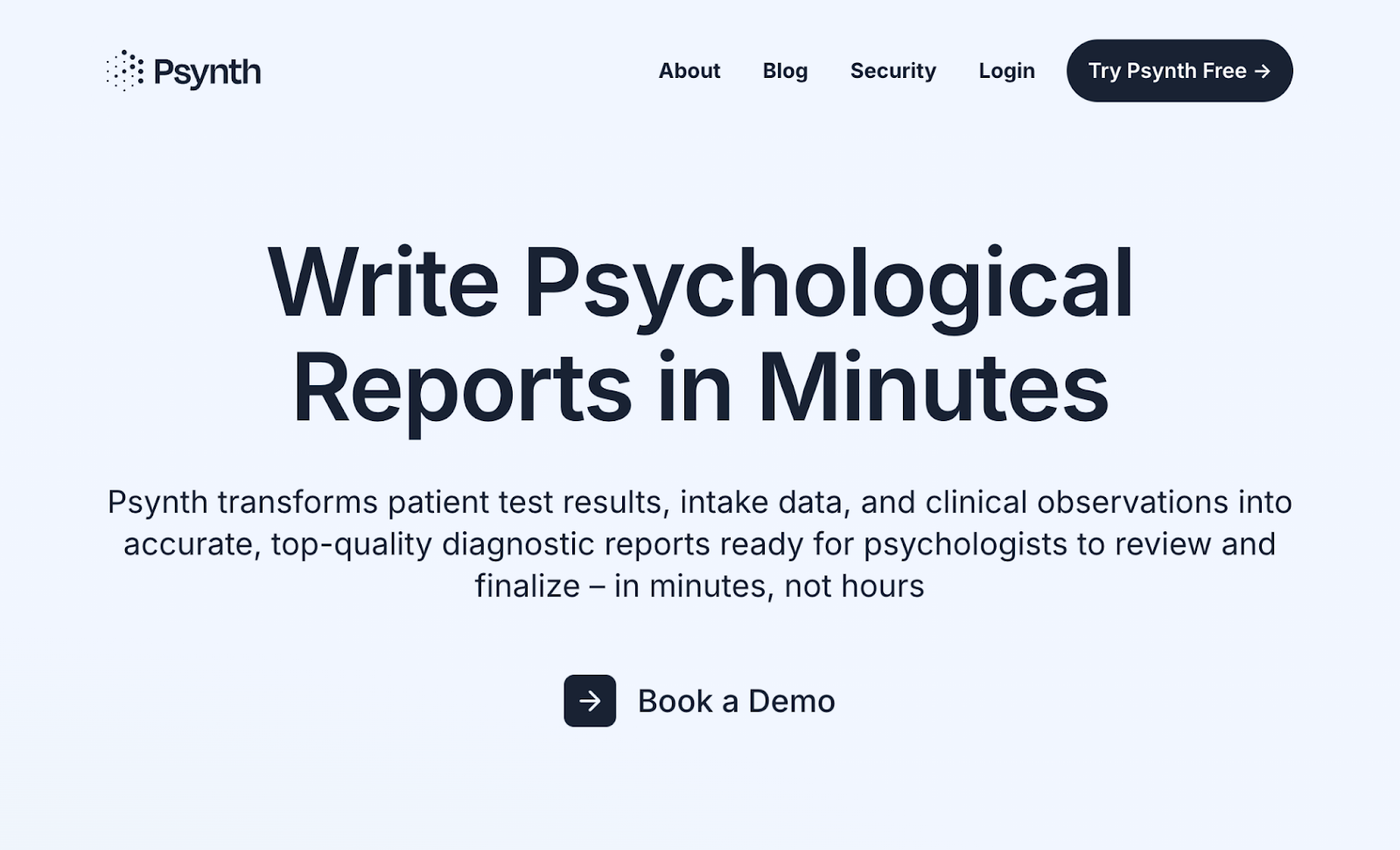
Psynth redefines how you complete diagnostic reporting. It uses AI to turn raw test scores, intake data, and clinical observations into high-quality, structured drafts in minutes.
No need to spend hours or your weekends entering scores, formatting tables, and organizing your notes. Psynth gives your valuable time back and lets you focus on patient care.
Built with valuable input from expert psychologists and psychometrists, the platform delivers PhD-smart reports that implement up-to-date best practices in the industry. Each output is fully customizable, so you can tailor findings to your specific voice, preferences, and clinical needs.
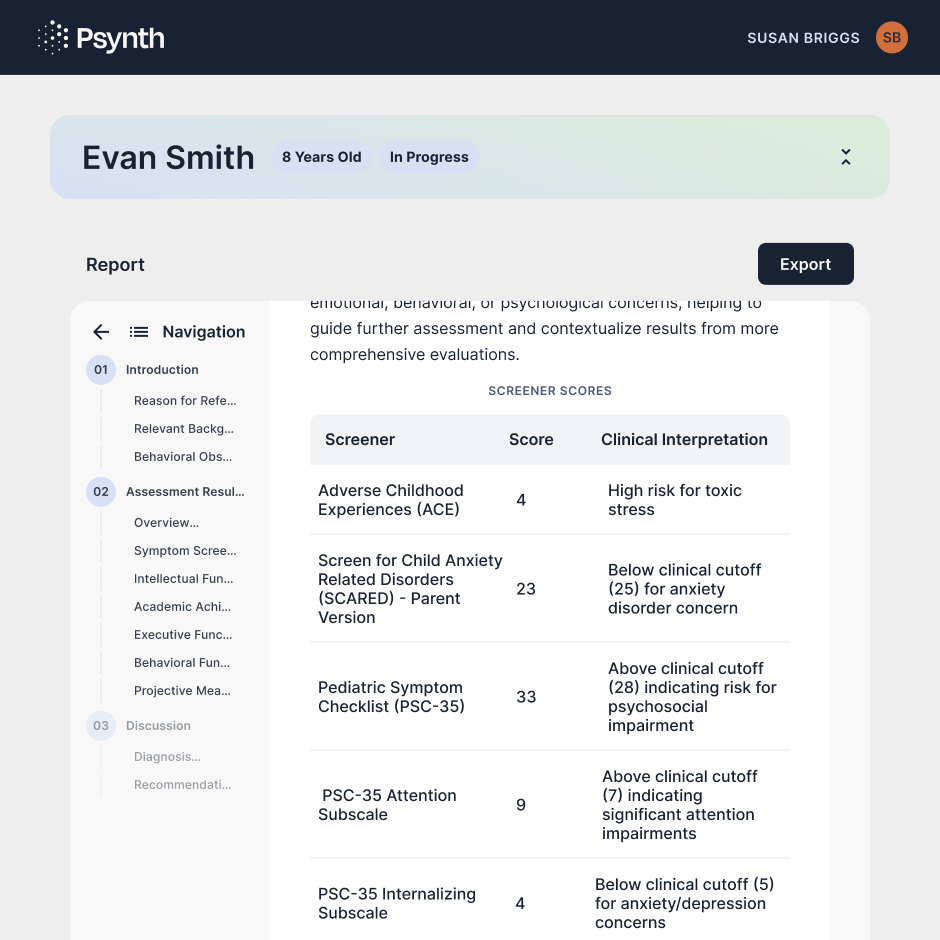
The platform also flags formatting inconsistencies or missing data through automated quality checks. This improves reporting accuracy and reduces errors.
Psynth supports more than 370 standardized assessments, including WISC, WIAT, and Vineland, all within one secure platform. It saves time and reduces manual input across different assessment types.
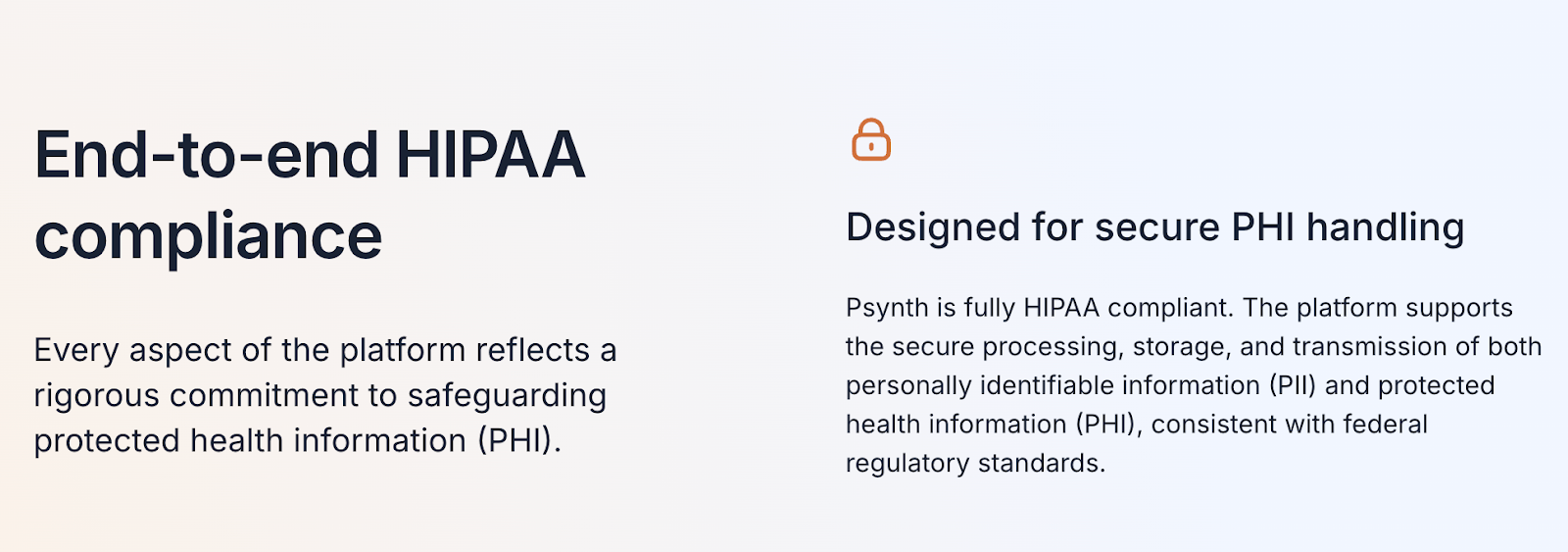
Privacy and security are built into Psynth at every level. The system is fully HIPAA compliant to protect both personally identifiable information (PII) and protected health information.
It uses end-to-end encryption, role-based access controls, audit logging, and zero-retention AI models that never store or reuse data. Plus, a signed BAA creates a contractual obligation to safeguard PHI and protect your psychology practice.
It’s worth noting that Psynth is not for psychologists who want to eliminate the assessment process. The AI tool writes diagnostic reports faster, but it’s not meant to replace the work. It’s simply built to take the weight off one’s shoulders.
Request a demo today to learn how Psynth integrates AI into your clinical workflow while staying HIPAA compliant. You can also read this privacy policy to review the platform's standards for handling data.
Key Features
- End-to-end HIPAA compliance: Psynth uses an encrypted Amazon Web Services (AWS) hosting environment that meets or exceeds HIPAA security requirements. It also has strict role-based access controls and audit logging to protect PHI.
- Zero-retention language model: Large language models never store, cache, or repurpose data used in AI-enabled report generation.
- Instant report generation: Create high-quality drafts from raw data and test results in minutes instead of hours. Diagnostic reports are built on validated, up-to-date best practices with input from expert psychologists and psychometrists.
- Seamless data intake: Psynth instantly processes PDFs, images, and handwritten notes without formatting required.
- Built-in quality checks: The AI tool detects reporting inconsistencies or missing data for your review.
- Editing tools: Customize reports to your liking using your own words or the built-in AI assistant. The platform automatically adjusts formatting for faster revisions.
- Wide assessment coverage: Psynth supports more than 370 psychological assessments, with space for other workflows that you might need.
- Smart diagnosis: AI provides evidence-based findings and clear explanations to improve your clinical judgment and diagnose patients with confidence.
- One-click export: Save reports as a Word file (.docx) without worrying about formatting issues.
Try Psynth for free today and complete diagnostic reports in under 45 minutes!
2. BastionGPT – Best for Secure Clinical Communication, Documentation, and General Assistance
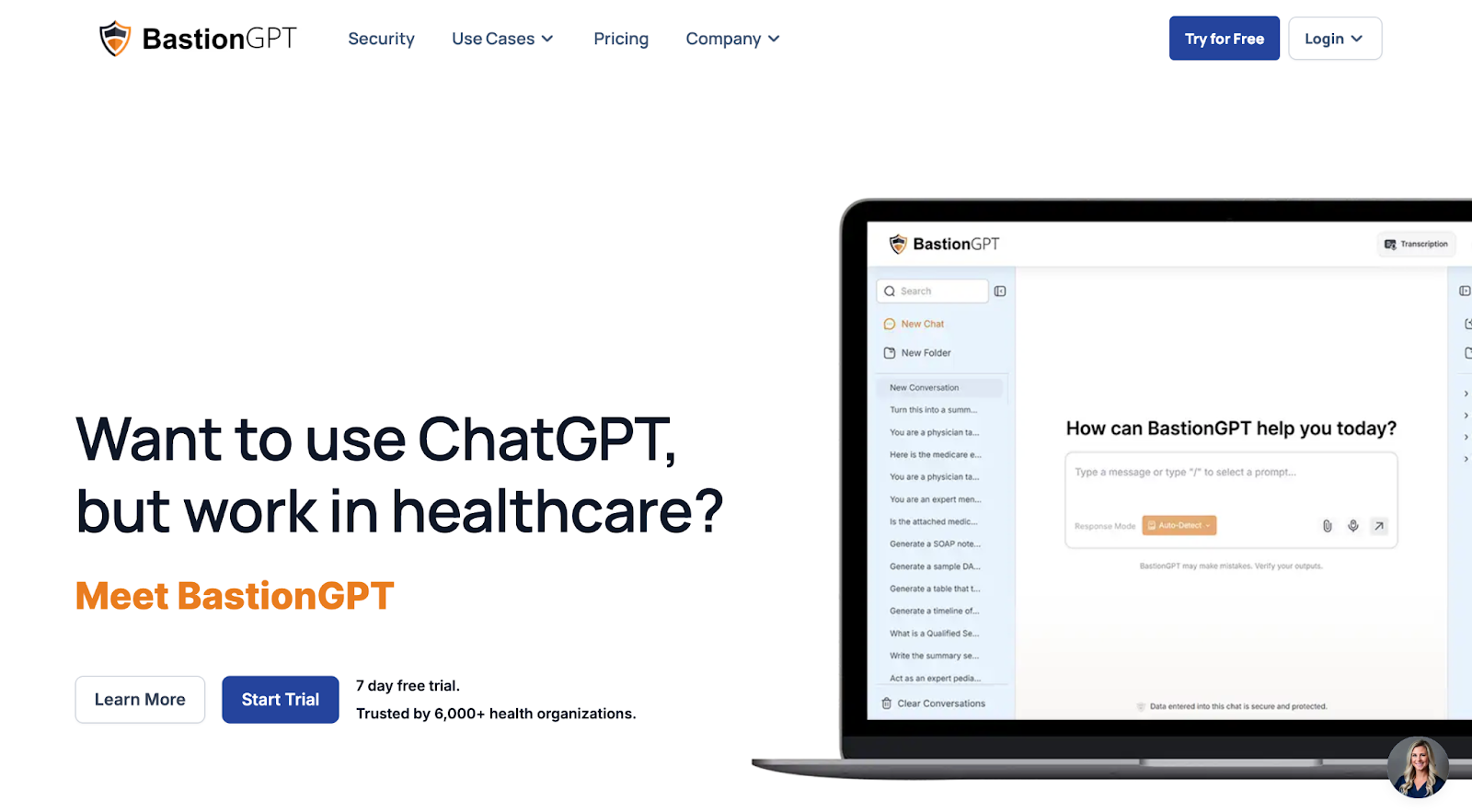
BastionGPT is a HIPAA-compliant AI assistant designed for psychology businesses and other healthcare practices. Think of it as a more secure and compliant version of ChatGPT.
It offers a private way to write, summarize, and communicate clinical information safely. It can draft treatment notes, generate summaries, or rephrase sensitive content without exposing patient data.
The platform uses reputable healthcare resources to prioritize medical principles and scientific accuracy. This ensures you receive evidence-based intelligence instead of pseudoscience and non-scientific recommendations commonly seen in generic AI chatbots.
BastionGPT is built with security in mind. It uses end-to-end encryption, zero data retention, and runs on HIPAA-compliant and 42 CFR Part 2-compliant systems.
All their plans automatically include a signed BAA at no additional cost. Plus, no conversations or uploads are sold or used for training AI models.
Key Features
- HIPAA and 42 CFR Part 2 compliance: Built for psychologists and other healthcare professionals to handle PHI safely and legally.
- Fully-encrypted data: BastionGPT uses TLS 1.2+ for data in transit and AES-256 for data at rest to secure every chat and upload.
- Risk assessments and penetration tests: Regular internal and third-party reviews detect potential threats or vulnerabilities, allowing BastionGPT to strengthen its defense measures.
- AI clinical assistant: Generate summaries, analyze documentation, and convert large documents within seconds. This reduces administrative burden without compromising data security.
- Reduced content filtering: Adult health topics, such as violence and sexual abuse, can be discussed within the platform.
- Evidence-based intelligence: BastionGPT gathers data from reputable healthcare resources to ensure scientific accuracy.
- Unlimited transcription: Translate recordings into draft notes, summaries, and custom reports that match your personal writing style and preferred formatting.
3. Heidi – Best for Transcribing and Note-Taking
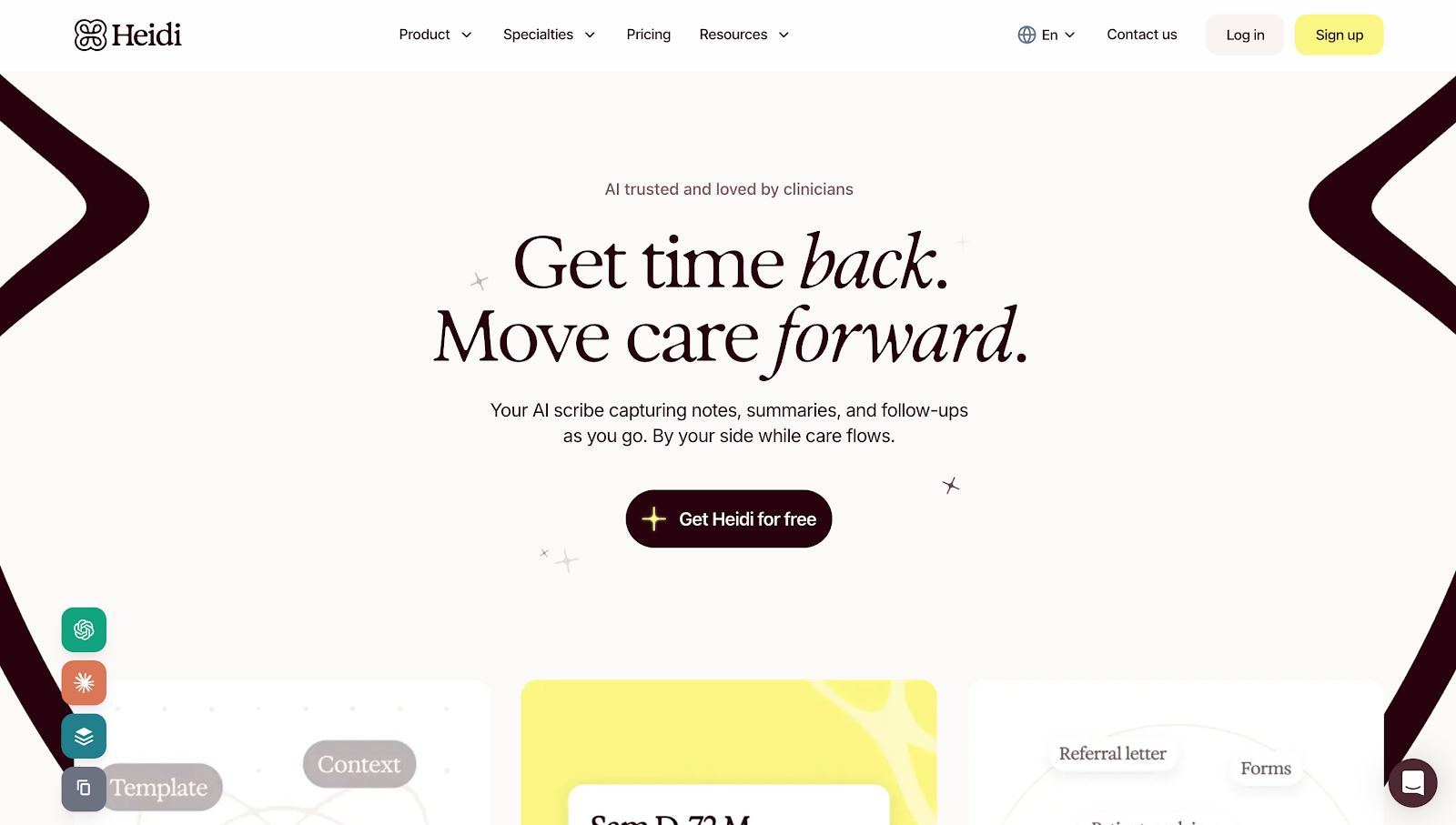
Heidi is an AI medical scribe tool that helps psychologists capture and summarize sessions. It intelligently listens, transcribes, and produces clinical notes without manual intervention.
The software handles documentation, language translation, and proper formatting in the background using ambient listening, while you can focus on the patient.
After the consultation, Heidi sends everything to your electronic health record (EHR) system in one click. It can even generate referral letters based on your notes, which saves hours every week.
Heidi is also fully committed to HIPAA compliance. The platform implements administrative, physical, and technical safeguards to protect PHI. Access is strictly controlled based on the principle of least privilege.
In addition, Heidi conducts regular risk analyses and rigorous training sessions on HIPAA regulations. It even offers signed BAAs to support individuals' rights.
Key Features
- Security safeguards: Heidi implements strict access controls and follows HIPAA standards to protect patient information.
- Risk analysis, management, and training: The platform conducts risk assessments, manages security incidents, and provides regular employee training to maintain HIPAA compliance.
- AI-powered ambient listening: Transcribe sessions into well-structured notes, which are formatted for easy review and storage.
- Multi-language support: Create notes in your client’s preferred language (Mandarin, Spanish, etc.) while you write in yours.
- Automated letters: Generate referral letters, treatment summaries, and discharge notes within minutes.
- EHR integration: Connect seamlessly with popular EHR systems for smooth workflow and one-click upload.
- Customization options: Customize terms, abbreviations, and fixes to fit your psychology practice. You can also set shortcuts to improve operational efficiency.
4. Therapy iQ – Best for Practice Management

Therapy iQ helps you run your psychology business from one secure platform. This all-in-one solution combines clinical, financial, operational, and compliance tools.
You can schedule appointments, send reminders, process billing, run telehealth sessions, manage your team, and monitor HIPAA compliance without juggling multiple tools.
This leads to improved profitability, reduced manual workload, and overall less stress when managing your practice.
Therapy iQ also processes all protected health information in accordance with HIPAA standards. The company signs a Business Associate Agreement with every client.
The Email iQ feature meets HIPAA compliance requirements, which encrypts all email communications with clients. However, the platform’s automated appointment reminder system, Messaging iQ, doesn't support HIPAA-compliant texting.
Key Features
- Encrypted telehealth: Host secure telehealth sessions with full HIPAA compliance, screen-sharing features, and a collaborative whiteboard.
- Secure client portal: Give clients access to appointments, payments, and forms in a secure digital space.
- Auditing tools: Track missing documents, signatures, and client activity with built-in self-auditing dashboards.
- Email and text reminders: Send automated reminders through encrypted email and SMS to reduce no-shows. While convenient, text messages are not HIPAA-compliant.
- Automated forms: Create and share paperless intake and consent forms that sync with your workflow.
- Scheduling and calendar management: Use self-scheduling, group management, and two-way calendar sync for easy coordination.
- Integrated payment processing: Accept credit, debit, and cash payments online or in person. Therapy iQ automatically records transactions and generates financial reports for easy tracking.
5. Doxy.me – Best for Telepsychology
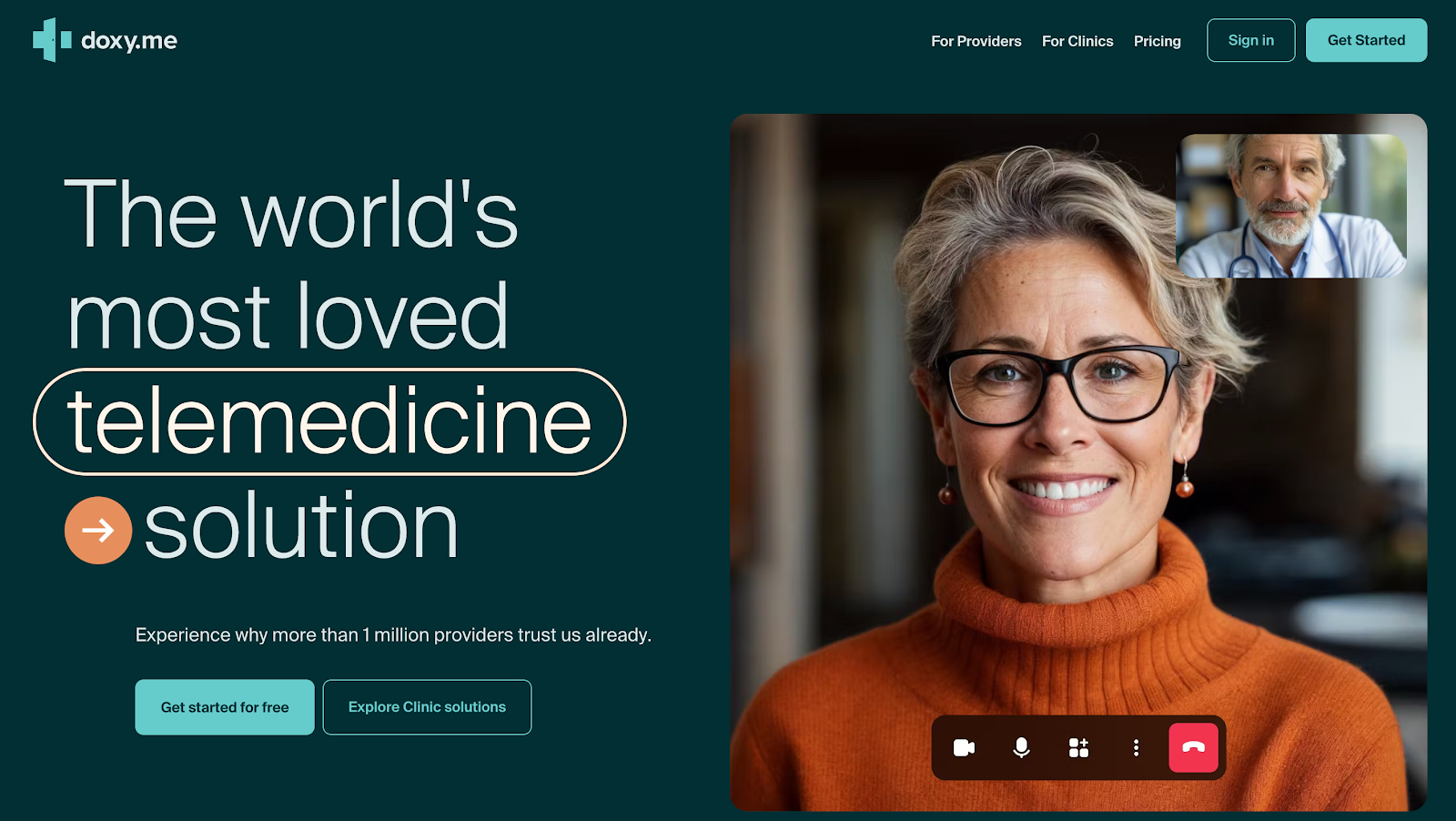
Doxy.me makes telepsychology simple and secure. It lets you meet with patients from anywhere using any browser on your desktop or mobile phone. You and your clients no longer need to install a separate app, making it easy to get started.
Sessions run smoothly, thanks to high-definition video resolution and audio quality. Live chat is also available within the platform, so you can talk to a patient while you're still on a call.
Running late or meeting with multiple clients a day? Doxy.me includes a customizable waiting room that helps patients feel comfortable and confident that they are in the right place.
Meanwhile, a patient queue allows you to see that your next client is ready for their appointment.
The platform also uses enterprise-grade security that meets HIPAA compliance and other industry standards. All chat messages and video calls are fully encrypted to protect sensitive data. Plus, a free BAA is included in every plan.
Key Features
- End-to-end encryption: Doxy.me keeps every video, audio, and chat fully private and protected under HIPAA standards.
- 24/7 monitoring and vulnerability scans: Security professionals run continuous checks to detect and block threats in real time.
- Browser-based access: Patients join telehealth sessions directly through a secure link. No downloads or logins required.
- HD video and audio: Provide clear, reliable video call quality to improve the patient experience and make your psychology practice look professional.
- Live chat: Communicate with a client through chat, even while you are on a phone call with a different patient.
- Virtual waiting room: Customize your waiting area with photos, videos, or resources while patients wait. You can also see the queue in your waiting room and jump between patients quickly.
- Meeting history: View past sessions and meeting details (date, time, or duration) without storing or exposing private health data.
6. Qualifacts iQ – Best for Electronic Health Records
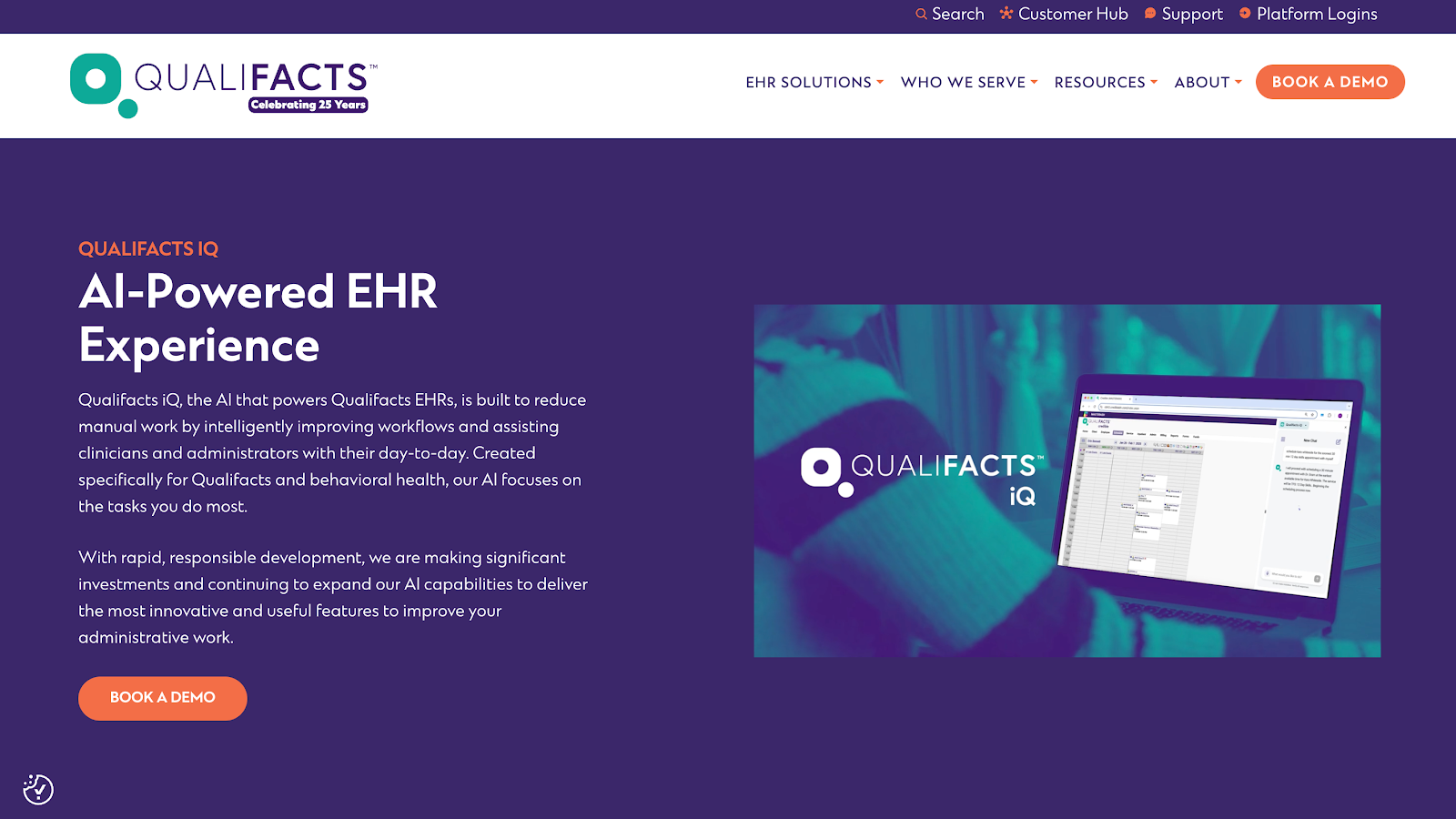
Qualifacts iQ reduces manual work for psychologists by improving current workflows and automating daily tasks.
It automatically generates formatted notes using ambient listening intelligence. This allows practitioners to focus on patient engagement without worrying about note accuracy.
Meanwhile, the built-in AI assistant instantly answers questions and pulls up documentation by browsing through the knowledge base.
Qualifacts iQ also takes care of time-consuming and repetitive tasks, such as billing and client scheduling. It frees up valuable time to focus on more impactful activities and key areas of your psychology practice.
For data security, the platform meets strict HIPAA, SOC II, and ONC certification standards. All data stays within the Qualifacts environment. A business associate agreement also provides further data protection and clarity on how Qualifacts discloses PHI.
Key Features
- Secure environment: All data is stored within Qualifacts, which meets HIPAA, SOC II, and ONC certification requirements.
- Intelligent documentation: Generate structured, editable notes using ambient listening technology.
- AI assistant: Answer questions and locate documentation in seconds to help EHR users find what they need.
- Task automation: Qualifacts iQ handles billing, client scheduling, and other admin tasks to save valuable time and reduce manual effort.
- EHR integration: The platform works seamlessly with Qualifacts’ CareLogic, Credible, and InSync systems for full workflow alignment.
- Multi-language support: Document records in over 120 languages, improving accessibility and communication.
- Client engagement tools: A telehealth solution and a client portal keep clients engaged and connected with your psychology practice.
7. Paubox – Best for Email Communication
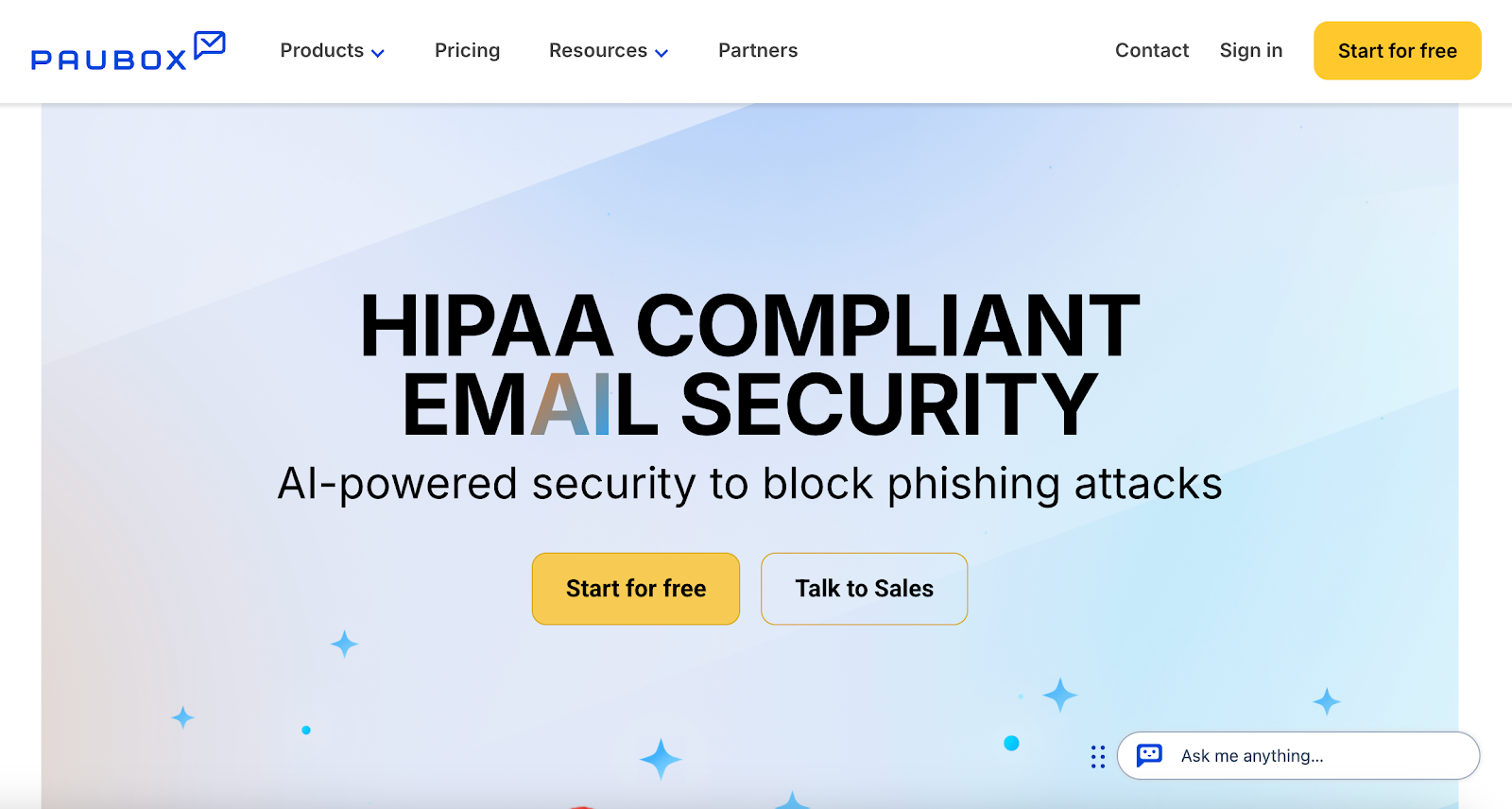
Paubox offers secure, HIPAA-compliant email solutions for psychologists and healthcare providers. It encrypts every message to protect sensitive patient data against phishing attempts and AI-engineered attacks.
However, Paubox goes beyond email encryption. It also stops threats before they reach your business inbox. It uses AI behavior detection technology, generative analysis, and continuous learning to block email attacks.
The Email Suite platform works directly with Google Workspace or Microsoft 365. This keeps your existing email address intact while providing a seamless experience for recipients.
Paubox is also HIPAA compliant by design. It includes a signed business associate agreement and persistent storage for its server instances to protect data in case of emergencies. Plus, the system implements various disaster recovery mechanisms to meet HIPAA requirements.
Key Features
- Automatic email encryption: Protect every message that contains healthcare data.
- BAA coverage: A signed BAA offers legal protection and proves full HIPAA compliance.
- Inbound threat protection: Detect and prevent security threats in real time.
- Seamless email integration: The platform works directly with Gmail and Microsoft 365, keeping your current workflow intact.
- Data loss prevention (DLP): Paubox scans outgoing emails for sensitive information to prevent accidental data exposure.
- Email archiving: Keep records organized and accessible for audits.
- Personalized marketing: Send HIPAA-compliant email campaigns to improve marketing outreach without compromising patients' privacy.
Psynth Saves You Hours on Report Writing Without Compromising Security

Psynth helps psychologists reclaim valuable time that’s often lost to long hours of report writing. The AI-enabled software processes raw data (test results, intake notes, and clinical observations) into structured, high-quality diagnostic reports in minutes.
This means less time spent typing and more time focused on patient care, analysis, and growing your practice. As one of their clients, Dr. Molina, says, “I haven’t worked a weekend since using Psynth... I really feel like a new person.”
Data security is never compromised because HIPAA compliance is the foundation of Psynth. Every report is generated using zero-retention AI models, so nothing you upload is ever stored, cached, or used for training.
Psynth also encrypts all data, including personally identifiable information and protected health information, using AWS services that meet or exceed HIPAA compliance requirements. Everything is continuously monitored and updated in line with best cybersecurity practices.
There's also a signed business associate agreement to ensure legal protection for sensitive health information.
Try Psynth for free today to see the end-to-end report writing process and learn how your data is protected!
FAQs About HIPAA-Compliant AI Tools
Does ChatGPT have a HIPAA-compliant version?
No, ChatGPT does not currently offer a HIPAA-compliant version. OpenAI’s models are not specially trained versions designed to process PHI under HIPAA privacy rules. Psychologists and other healthcare professionals should only use verified platforms with documented PHI security controls and a signed BAA to handle patient data safely.
Is OpenAI HIPAA compliant?
OpenAI does not meet HIPAA compliance. The company has not announced a HIPAA-compliant AI agent or system that meets healthcare industry standards. Psychologists handling sensitive information should choose solutions like Psynth that guarantee encryption, access control, and due diligence through BAAs and HIPAA-compliant infrastructure.
How to make AI HIPAA compliant?
AI systems become HIPAA compliant when designed with clear safeguards for patient privacy and data integrity. HIPAA compliance depends on encryption, audit trails, and strict role-based access controls. Vendors must complete regular audits and sign a BAA confirming shared responsibility for PHI security.
Is Claude AI HIPAA compliant?
Claude AI can be HIPAA compliant, but only for commercial or enterprise customers who have a signed BAA for their account with Anthropic (the parent company of Claude AI). Tools such as Psynth use Claude as a model.
Google Gemini has the same option. The standard app is not HIPAA compliant. But if an organization uses Gemini through Google Workspace and has signed a BAA with Google, Gemini can be considered HIPAA compliant.



